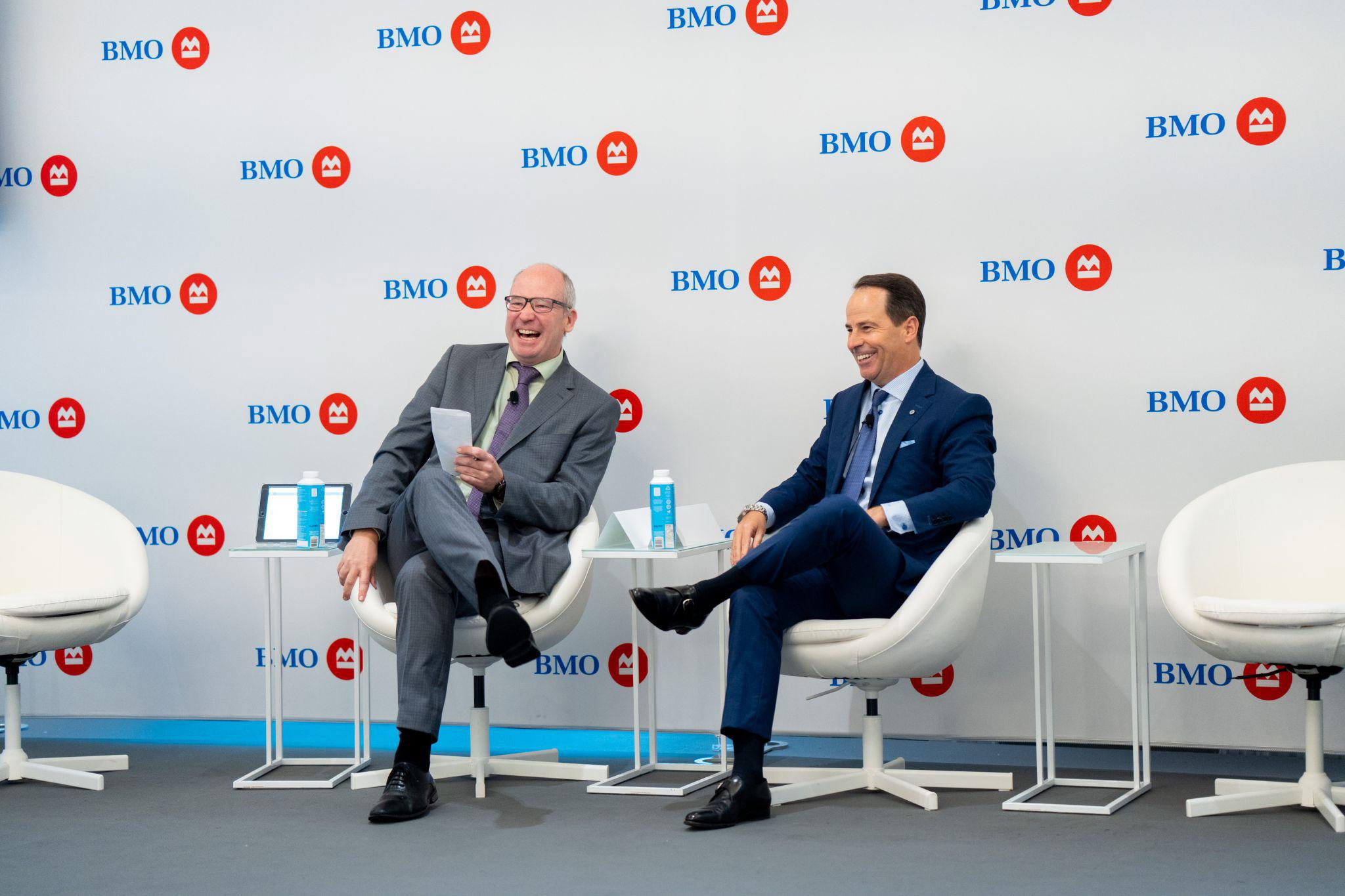From artificial intelligence and the health of the banking system to press freedom, almost no stone was left unturned between Darryl White, CEO of BMO Financial Group and David Walmsley, Editor-In-Chief of The Globe and Mail, during their fireside chat at the BMO Government, Reserve & Asset Managers Conference.
Banking Sector Stability
The discussion began with a question from David on the differences between the Canadian and American banking sectors, given the recent U.S. bank failures. “There are a lot of similarities between the Canadian system and the U.S. system, and there are some core differences, too,” said Darryl, pointing out that BMO has a good sense of the challenges both systems face, with roughly 50 percent of its business coming from the north and 45 percent coming from the south.
The key difference between the two countries is that there are thousands of banks in the U.S., with many focused on niche areas, while in Canada, roughly 85 percent of all deposits are concentrated within six of the largest banks. “That might sound like a high deposit share, but those five or six banks compete relentlessly with each other every single day and provide lots of choice for the consumer,” he said. "In Canada, we sit in an environment where it's properly set up for the nexus, the meeting point of enough consumer choice."
In the U.S., smaller banks are less diversified, which is a “very bad recipe” when you have a 500 basis point rate increase coupled with a concentrated deposit strategy, he said. “You might have managed one risk well or the other. But if you haven't managed both together, you have a problem. I don't see that in Canada. It doesn’t mean we’re immune, but we have a very different industry and regulatory structure.”
Financial Sector’s Role in Society
David asked Darryl about the role banks should play in helping improve the broader society. Darryl acknowledged it’s a complex question and mentioned the bank’s lead role and partnership with United Way Greater Toronto in the Inclusive Local Economic Opportunity (ILEO) Initiative. The ILEO brings together the private, public, and community sectors to find innovative ways to reduce gaps in economic prosperity at the neighborhood level.
Ultimately, collaboration between all stakeholders is key. “Without cooperation between regulators, government, the corporate sector, the financial sector, and the community, you’ll never get there,” Darryl said.
Press Freedom
Given that May 3, the day of the fireside chat, was World Press Freedom Day, Darryl and David discussed freedom of the press and how geopolitical relationships depend on this now more than ever.
“It’s a real challenge,” said David, adding that one of the biggest pressure points in the news business is not being able to go into the places where we know the news is happening. The Globe and Mail, for instance, can’t go to Khartoum in Sudan or into Russia because it’s unsafe. If you can’t get in, you lose the capability for objective reporting.
In April, The Wall Street Journal reporter Evan Gershkovich was arrested in Russia, an incident that sent shockwaves through the journalism community. David said he’s working with Ottawa to persuade the government to help free the reporter, while U.S. President Joe Biden has “been very aggressive” on the matter. “He's not going to be forgotten, which is a key element as well in doing these things.”
Reinforcing the valuable role of journalism in society drives BMO’s support for the Michener Foundation and the Canadian Journalism Foundation, celebrating excellence and supporting professional development, including the Canadian Journalism Foundation (CJF) Black Journalism Fellowship Program and the Michener - L. Richard O'Hagan Fellowship for Journalism Education.
North American Advantage
Naturally, the conversation turned toward the future. With so much geopolitical and economic change happening now, David asked where Darryl would lay his bets over the next 30 years. His answer? North America.
“When I look at the resources we have in North America, from human talent to agriculture to technology to immigration in this country right here, 100 miles from here, rare minerals to fuel the electrification of the world, there isn’t anything the world needs that we don’t have,” he said. “So I put my bet geographically on North America over the next 30 years.”
However, Darryl believes there is room for Canada to improve internal free trade. “If we could just get free trade between our provincial borders, we could probably create a full 100 basis points of GDP,” he said. “We've got real opportunities to unlock value within the North American continent. I think it’s on us to get at it.”
Impact of AI
One of the last topics discussed was the future of AI, which Darryl said “will be the issue of our time. Both on how we use it for good and avoid the perils.”
One audience member asked if there was enough scrutiny around the ways in which technology, and AI, is being used in society. David pointed out that Geoffrey Hinton, often called the godfather of AI, has raised alarm bells recently around the technology. “That’s a jumping-off point for us to understand the wrestling match between technology and convenience, which is what the public demands. How do you marry the two?”
Boldy Growing the Good in business and life
Bringing the conversation back full circle, Darryl discussed everyday challenges BMO is working to solve. “When we developed our Purpose Statement a few years ago to Boldly Grow the Good in business and life, we chose three very specific pillars: For a Sustainable Future, for an Inclusive Society, and for a Thriving Economy. And we did that so deliberately because those should not be in conflict.” BMO’s purpose helps guide its decisions and align its actions to drive progress for clients, colleagues, and communities.
